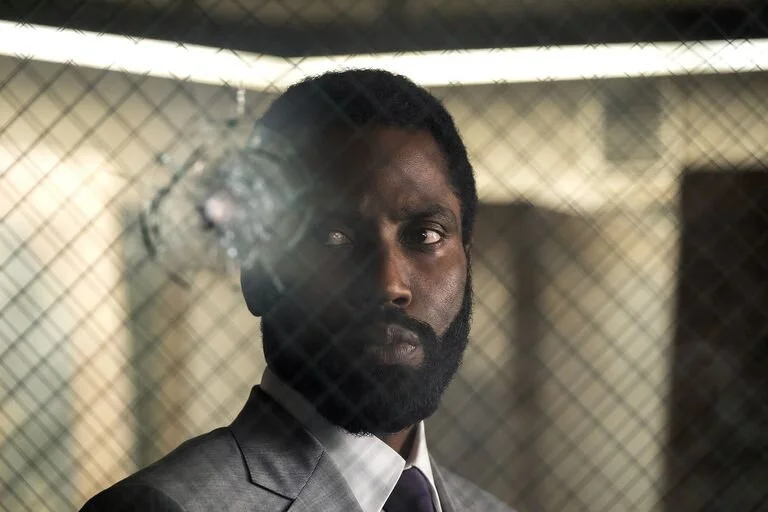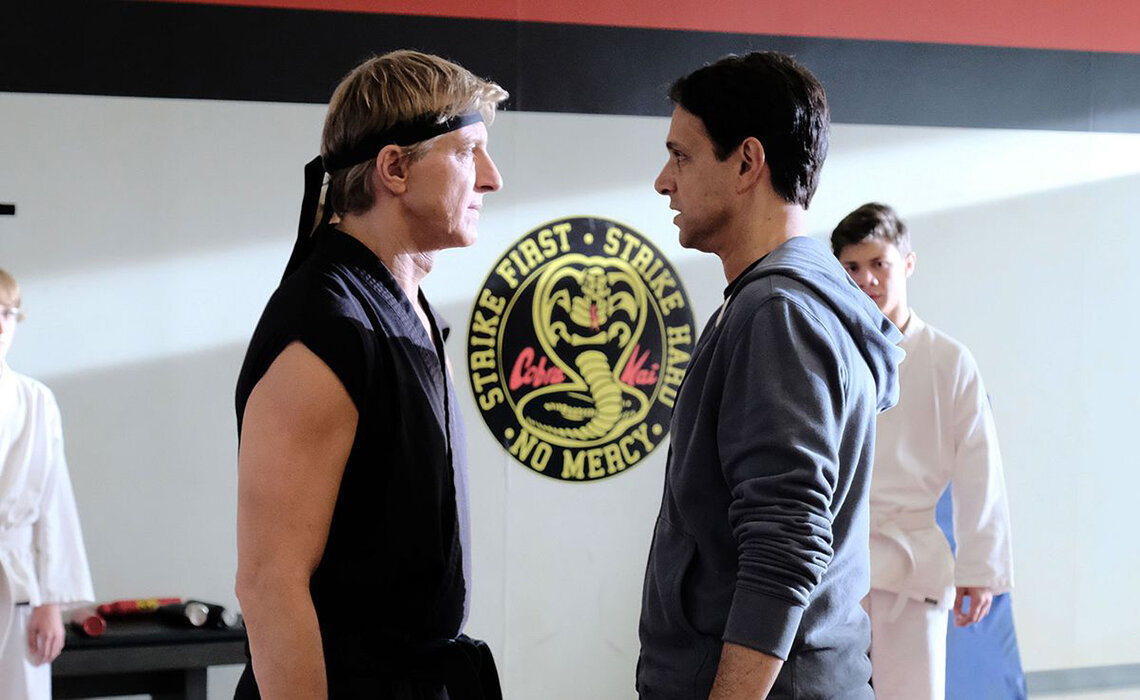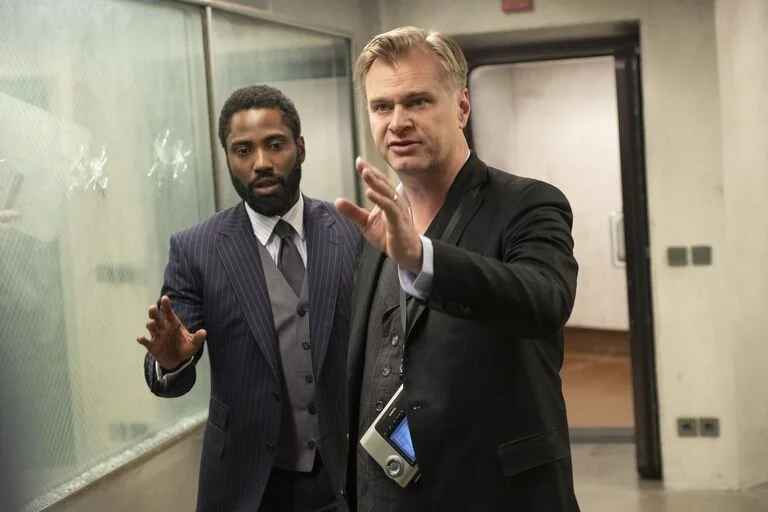The (Possibly Unexpected) Best Men of 2020
John David Washington’s turn as “the protagonist” in Tenet is colder than that look on his face, but it’s a good thing.
Also, yes, this man is Denzel’s son.
Image: Warner Bros.
Go ahead and hate 2020.
Hate it.
If you’re one of many who’ve held it in, curse this year with the restrain of five leviathans.
Loathe this year like one does the sight of a waiting room, or a letter from a lawyer.
Everyone hates 2020, so it’s ok. Hop on the Hate Train and nestle into your seat.
While you’re there, stew. Stew in your foul ire like you’ve never stewed before, and furrow your brow while you do it. Speak foul language, too. They made you stay inside like a gerbil.
They turned your trips for bathroom essentials into an obstacle course from American Gladiators.
Don’t look outside at the paralyzing beauty of nature. This isn’t that kind of ride, and soon the steel blinds will close and blot out life’s panorama anyway. Instead, take a good gander down the hallway and meet the miserable company by which you’re surrounded. They’re stewing, too. Some stew harder while others for no other reason than to stew. It’s easy to stew.
It’s easy to sit there and chew on the tempting scraps of a year best left behind.
But does that ride sound like actual, quantifiable fun? Of course not.
Check out this quote:
“Anybody can become angry, that is easy; but to be angry with the right person, and to the right degree, and at the right time, and for the right purpose, and in the right way, that is not within everybody’s power, that is not easy.”
The great Greek philosopher, Aristotle, wrote that over 2,000 years back in his lauded work, The Art of Rhetoric. Whether or not he’d had stuck to it in the face of a mandatory global lockdown is fun to ponder. Still, there’s a timeless value in such words, one that’s undeniable.
Get mad, it’s good for you. In fact, according to a 2017 blog post written by Dr. David R. Topor, Assistant Professor in the Department of Psychiatry at Harvard Medical School, “habitually” accepting that shitty feeling one feels in a bad situation is better for one’s long term mental health than, yes, stewing. Dr. Topor cites a study from July 2017 that tests the “psychological health of people who accept, rather than negatively judge, their emotional experiences.” Part of the study followed the daily lives of a community of participants in Denver, Colorado. They were told to keep journals and describe how they felt about their every stressor, and not that it’s surprising, but the ones who made a habit of owning their fate reported better mental health six months later. And sure, this sounds like common sense, but that doesn’t mean we all act like it.
Again, anger is good. But for the sake of your own sanity, don’t stay mad.
For the record, this isn’t for those of you who’ve lost a loved one or a well-paying job this year. There are no words to define or justify that kind of hell. And our thoughts are forever with you. But if you’ve found even a crumb of comfort in knowing there’s hope, then stick around.
This list is for all of you who’ve eaten one haymaker after another this year, and are still standing.
Like the three men you’ll see below, you’ve all faced peril, survived, and grown.
One thing, though: Unlike some best men lists that are out there (some of which are, you know, good), this one’s got a twist of sorts: It honours men not from this reality, but one that’s closer to it than you’d think. And there’s plenty to learn from these guys, whether it’s ditching the life of a beer-swilling bully to save disenfranchised kids or conquering your past trauma to be the best damn bounty hunter in the galaxy.
Ladies and gents, your best men of 2020.
Johnny Lawrence From Netflix’s Cobra Kai
Don’t get your hopes up, these guys don’t kick each other’s asses much in this show. But there are tough life lessons to be learned from Cobra Kai.
And other people get their asses kicked, so don’t worry about that part.
Image: Netflix
Go back to 2019 for a second. If you were told then that The Karate Kid had a sequel slated for 2020 — and via a Netflix mini series, no less — half of you would’ve been out. But who’s to judge? The 1984 original earned its stripes as a cult classic that could. The way it juxtaposes the darkness of bullying and teen violence with uplifting messages like the importance of self-respect? Come on. Not to mention bad remakes abound today, so people dodge them (as they should). But this thing’s a rarity — a remake that respects what’s original and winks at what’s relevant now, and the best part isn’t Danny LaRusso or Pat Morita and his perfect adages (RIP). No. It’s the guy who’s face met Danny’s heel in The Karate Kid’s thrilling last scene, Johnny Lawrence. The show’s set in the present day, and Lawrence is, in a way, right where we left him last — down and out. Only now he’s drunk, unemployed and chuffed at the world for it. What’s worse, his arch-rival, LaRusso, is now a well-to-do car dealership owner (and a happily married one with kids, at that) whose face dons billboards and whose blunt capitalism taints his past innocence, if only a little.
From stare downs to strong drinks, Johnny never backs down.
Image: Netflix
And yet, it’s the Nietzschean journey Lawrence takes from douchebag villain to redeemed hero that makes the whole thing worth following. And he does it by Spoiler Alert leaving a deadbeat life, opening a dojo then teaching wayward teens the way of karate. And it’s got “Don’t Look Back” by Boston. And awesome montages.
What more do you want?
We salute Mr. Lawrence not only for proving man can change for the better if he wills it, but that the road to self-fulfillment comes with a beating or two.
Catch season three now, it just came out.
Din Djarin From Season Two of The Mandalorian
No, folks, this isn’t baby Yoda. But yes, it is a baby alien, one that hails from the same line of ancestry that gave us Yoda, hence the same look.
Image: Disney+
Remember that George Lucas purist you worked with back when working with people was a thing? Remember their annoying references to canon no one knows and their stupid R2-D2 ringtones? Remember how they said The Mandalorian is an underived work of art that respects Lucas’ lore and vision while delivering something fresh and new? They were right.
But what’s best about this entry in the Star Wars saga (one whose storytelling limits seem to match those of our collective bank accounts) is neither its nods to the past (welcome back, animatronics) or a near-perfect script by the great Jon Favreau, but the journey of the show’s main man, Din Djarin. Orphaned by war then raised by a secretive clan of bounty hunting death dealers (albeit one with iron-clad codes), our protagonist sees it all. And like the absolute beast he is, Djarin (played with aplomb by Pedro Pascal) proves there’s little that can’t be done with brains and some balls.
He takes on sand dune-surfing monsters the size of a small village, has his ship picked clean of parts by a pack of nomadic dwarfs (then later negotiates with them for said parts), and almost fries in a fire caused by Imperials, and all while protecting a powerful baby alien from several abductors, each sent by an Empire reeling after the events of Return of the Jedi (remember how Han and co. blew up death star two at the end?).
Throughout all these hardships, Djarin never snaps. Instead, he makes Marcus Aurelius proud and stays stoic, always knowing that potholes are part of life. And just when you think he’ll break, he finds a way to hold it all together (even in the face of impending death).
If you’re new to all this, season two premiered last fall and season three’s on its way.
Go catch up, it’s worth every second.
The Protagonist From Chris Nolan's Tenet
If you think you can watch Tenet once and get what’s happening, good luck.
Image: Warner Bros.
Tenet — otherwise known as that Christopher Nolan movie that pissed off his fans — is not without its problems. For an action-meets-time travel flick about the need to save the world, it’s too big of a labyrinth to endure, and sometimes, the dialogue’s impossible to hear. Did the Brit who gave us gold with The Dark Knight and Dunkirk give us unintelligible exchanges on purpose? Did he do it to piss us off?
Likely not, but if you haven’t seen this thing, now you know why it flew 2020’s flag of division in film.
Ask anyone who saw Tenet (Nolan’s 11th film) and they’ll tell you it’ll be remembered as a misunderstood masterpiece. But ask the next, and they’ll tell you it’s trash.
Either way, the film’s main character (who Nolan chose to name “the protagonist,” but hey) is a man whose resolve is worth admiring.
John David Washington (Denzel’s son) plays a CIA agent tasked with stopping a Russian madman (a scary Kenneth Branagh) bent on starting World War III via a technology that can change the present from the future.
Does Washington hit Oscar levels here? No. He’s too solemn, too quiet.
In fact, he’s so pragmatic you’d think he were an android. In his unbending dedication to the job at hand, the Protagonist’s content with always being on. And while it’s an even colder take on the Jason Bourne neo-spy template, Washington’s acting is no less raw. Forget the one-liners once uttered by the Bonds of this genre. This man does what’s needed, even if he’s got to do it with time happening in reverse.
It’s not for everyone, but then neither is Nolan’s style.
No matter what, there’s a real sense that if the protagonist wants you, he’ll find you, the very rules of time itself be damned. And how can you not respect the fact that Washington — a former Morehouse College running back — did almost all his own stunts for the film?
Now that’s our kind of guy.





